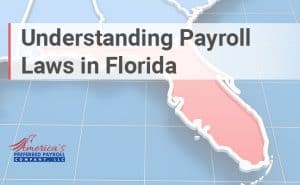When you cut a paycheck, there are a lot of deductions. There are federal taxes, state taxes, unemployment insurance taxes, and more. Federal taxes tend to be the biggest chunk, but Florida’s payroll tax is a little different.
Let’s take a look at Florida’s payroll taxes and how they compare to others on a national level — as well as how they are going to be affected by the economic damage of the pandemic.
Florida’s Payroll Taxes
First, Florida is one of the few states without a state income tax. In Florida, you will need to pay federal income taxes; you still do need to pay some income taxes. But you don’t need to pay state income tax. These income taxes are generally made up in sales taxes and property taxes instead; sales taxes and property taxes can compensate for income taxes in terms of the government budget.
Of course, payroll taxes are more than just income tax. They also include unemployment insurance, which is going to be a big adjustment for employers paying their taxes in 2021. Employers may see their tax payments going up substantially because of increased unemployment rates.
This is not yet set in stone; Republican politicians are talking about using part of the stimulus package as a way to reduce the amount of taxes Florida’s employers need to pay. Senate President Simpson has stated that he would be interested in taking $1 to $2 billion of the stimulus package and using it in this way. It’s unclear how much support this initiative would have locally or whether it could get off the ground.
In addition to unemployment insurance, employers will still need to pay health care, any retirement account matching, and other benefits as a part of their payroll deductions. Because the situation is changing so rapidly in terms of unemployment insurance rates and potential economic stimulus, it’s important that employers keep abreast of the current news. A payroll service can help companies that are unsure of their current payroll tax liability.
How Does Florida Compare Nationally?
Florida has much lower payroll taxes than many other states because there are no state income taxes. So, on a national level, paychecks in Florida will have fewer deductions — and pay fewer taxes overall. Only nine states in the United States have no personal income tax. Sales, property, and estate taxes tend to bridge the gap.
Per capita, states with the highest payroll taxes include California ($2,055) and New York ($2,929). Florida has about an average sales tax and an average property tax as well, making it so that many residents in Florida pay fewer taxes overall. The average state payroll tax is about 6 percent across the board.
But again, this could be much higher this coming year, as unemployment insurance is likely to skyrocket. Many more employees in the past year have been unemployed than in virtually any period before. Unless part of the economic stimulus is used to alleviate these costs, employers are going to need to set aside an additional 4 percent or so of their payroll solely to unemployment insurance costs.
Usually, unemployment taxes range from about 0.1 percent to 5.4 percent. The business matters, too; an organization’s history, in terms of unemployment, is calculated into their rate. Consequently, employers who have seen more layoffs than others are going to see higher rates than those who have been able to retain their employees throughout.
When business owners make mistakes with their accounting, it’s most commonly because of payroll. Not only is payroll complicated, but it changes quite often. If you want to get your payroll correct every time without worry, it may be time to outsource your payroll operations. Contact us to find out more.













